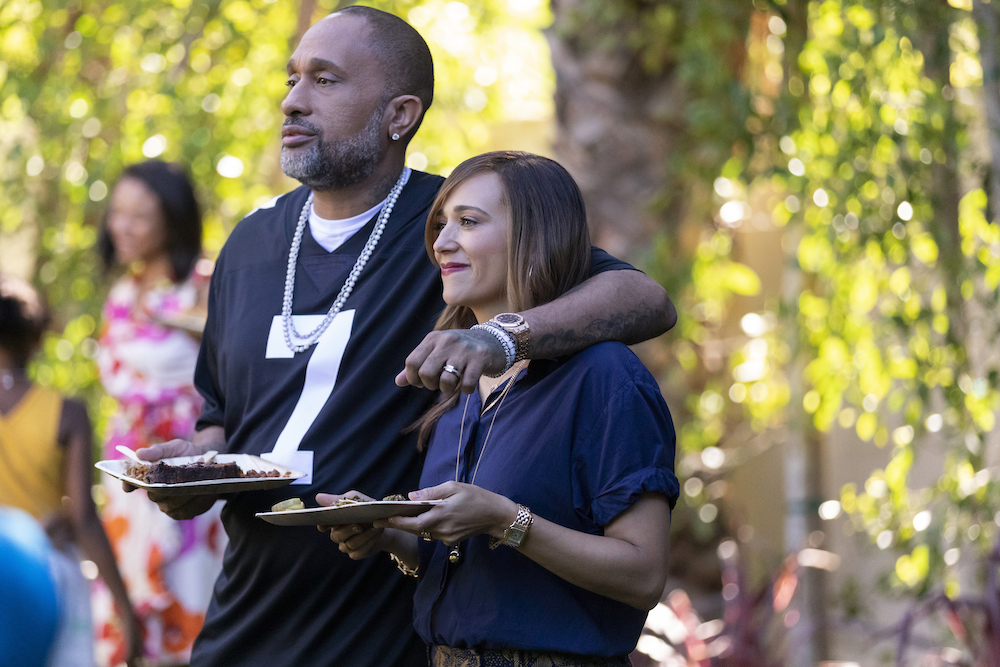Though the words “Unapologetically. Unforgettably. Unabashedly. Unforgivably” scroll across its opening credits, Kenya Barris’ newest series “#blackAF” (with eight episodes premiering Friday) is anything but. The sitcom serves as Barris’ first starring role, donning the persona of an exasperated and narcissistic father of six, navigating a new baller lifestyle and television empire. Like his previous projects, “Black-ish,” “Mixed-ish,” and “Grown-ish,” he mines his personal life to discuss a range of topics, including parenting, marriage, and race. Filmed as a mockumentary by his fictional daughter Drea (Iman Benson) for her NYU film school application, the resulting meta family sitcom is an unfocused series that never hits its stride and whose audience is left undefined.
“#BlackAF’s” odd resistance to engaging viewers begins with its fictional family, an unlikable motley crew of spoiled and overly earnest personalities composed of three girls and three boys. With the exception of Barris’ beleaguered personal assistant Danny (Gil Ozeri), every member of the household is in continual competition with the other. Playing Barris’ fictional wife Joya—the program’s only redeemable character other than Danny—is Rashida Jones, who offers the series’ best acting among wooden performances.
Much as the sitcom tries otherwise, “#blackAF” is only surface level. Each episode has “slavery” in its title, like “I Know This Is Going Crazy … But This, Too, Is Because of Slavery,” and features voiceovers by Drea to explain how Black fashion, the white gaze, adultification, and a host of other issues relate back to antebellum America. These moments of abridged seriousness are slammed between jokes that have isolated punchlines about Prada and Rolex, lavish vacations to private islands, and luxury cars. The interest level with regards to wealth for us is scant, and most Black audiences are well-aware of how slavery has shaped current Black culture. Instead, one might guess that though the series is called “#blackAF,” its audience resides within an affluent white America.

Worst yet, no episode coalesces into a succinct arc. For instance, though one episode opens with the family’s celebration of Juneteenth as a framing device, it soon devolves into a gag involving an expensive black and white-speckled painting recently purchased by Barris for his home. His character time-and-again is asked to elucidate the artwork’s meaning, but he never quite squares it. Instead, the symbolism remains perceptibly out of reach. The moment is a metaphor for the entire series, an assemblage of disparate chapters whose greater ambitions are relegated to ambiguous importance.
Though “#blackAF” hits its peak with episode five (“Still … Because of Slavery”), the sitcom bites off more than it can chew. It first hopes to analyze the ways mixed-raced Blacks measure themselves against cultural perceptions of Blackness, a topic whose nuance requires an episode of its own. However, Barris soon switches to openly questioning if during this current ‘Black wave’ of film and television whether any sub-par work created by Black artists should require greater criticism from Black critics. It’s a cruelly ironic topic.
Rather than forming clear arcs, “#blackAF” instead relies on splashy celebrity cameos, memorable needle drops, and mockumentary-style camera work like shaky cam, whip pans, and obnoxious zooms, all which serve little purpose but to remind the viewer they’re watching a mockumentary. The characters are all thin veneers for a sitcom whose cleverness appears irregularly, and whose main joke doesn’t evolve past a father hating his children. By the series’ final three episodes, there’s an urge to give the family’s constant discord some emotional weight. It’s as if the writers collectively realized their series was solely composed of a string of random events rather fully formed narratives. Storylines like Barris’ rocky marriage with Joya or Drea’s loneliness would have had greater resonance had they been developed earlier on, but instead result in a finale made too outlandish to offer any closure or instill a desire for more. “#BlackAF” continues the diminished returns of Barris’ “-ish” series, and makes apparent his need to develop new ideas.
Whole season screened for review.












